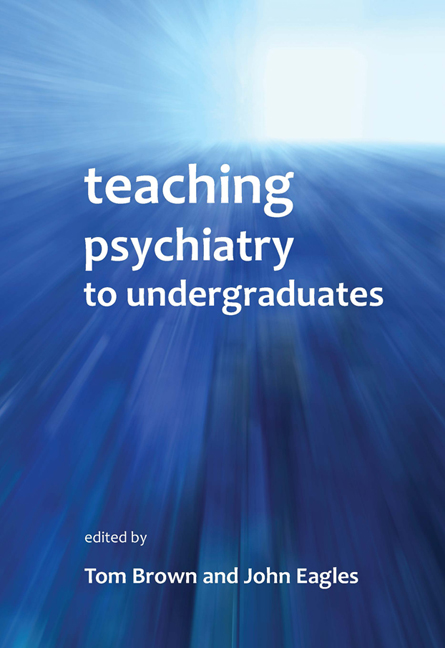Book contents
- Frontmatter
- Contents
- List of figures, tables and boxes
- List of contributors
- Preface
- Foreword
- 1 How do students learn?
- 2 Recent developments in undergraduate medical education
- 3 Undergraduate psychiatry teaching – the core curriculum
- 4 The organisation of undergraduate teaching
- 5 Assessment of undergraduates in psychiatry
- 6 Using computers to teach undergraduate psychiatry
- 7 How to give a lecture
- 8 How to do small-group teaching
- 9 Problem-based learning
- 10 Teaching trainee psychiatrists how to teach medical students: the Southampton model
- 11 Involving trainees in teaching
- 12 Involvement of service users in psychiatric education
- 13 Time-efficient clinical teaching
- 14 Intercalated degrees
- 15 Undergraduate experiences of psychiatry: a student view
- 16 Integration: teaching psychiatry with other specialties
- 17 Teaching the teachers in a cross-cultural setting: the Scotland–Malawi Mental Health Education Project
- 18 International undergraduate teaching
- 19 Teaching with simulated patients and role-play
- 20 Undergraduate medical education and recruitment to psychiatry
- 21 Choosing psychiatry: factors influencing career choice among foundation doctors in Scotland
- 22 Funding of the teaching of medical undergraduates
- 23 Dealing with students in difficulty
- 24 Training medical students to promote good mental health in secondary schools
- 25 Women in medicine
- Index
15 - Undergraduate experiences of psychiatry: a student view
- Frontmatter
- Contents
- List of figures, tables and boxes
- List of contributors
- Preface
- Foreword
- 1 How do students learn?
- 2 Recent developments in undergraduate medical education
- 3 Undergraduate psychiatry teaching – the core curriculum
- 4 The organisation of undergraduate teaching
- 5 Assessment of undergraduates in psychiatry
- 6 Using computers to teach undergraduate psychiatry
- 7 How to give a lecture
- 8 How to do small-group teaching
- 9 Problem-based learning
- 10 Teaching trainee psychiatrists how to teach medical students: the Southampton model
- 11 Involving trainees in teaching
- 12 Involvement of service users in psychiatric education
- 13 Time-efficient clinical teaching
- 14 Intercalated degrees
- 15 Undergraduate experiences of psychiatry: a student view
- 16 Integration: teaching psychiatry with other specialties
- 17 Teaching the teachers in a cross-cultural setting: the Scotland–Malawi Mental Health Education Project
- 18 International undergraduate teaching
- 19 Teaching with simulated patients and role-play
- 20 Undergraduate medical education and recruitment to psychiatry
- 21 Choosing psychiatry: factors influencing career choice among foundation doctors in Scotland
- 22 Funding of the teaching of medical undergraduates
- 23 Dealing with students in difficulty
- 24 Training medical students to promote good mental health in secondary schools
- 25 Women in medicine
- Index
Summary
Introduction
At the time of writing this chapter, we were both about to graduate in medicine from the University of Glasgow. We have been exposed to the specialty of psychiatry in a number of guises. These include a 5-week core curriculum placement, two 5-week student-selected components in psychiatric subspecialties and a 1-year intercalated bachelor of science degree in psychological medicine. From our experience, students often feel that they have had inadequate exposure to psychiatry. This may be because many complete only the minimum of 5 weeks in undergraduate training, often confined to one specialty and under the care of one supervisor. This can give an extremely narrowed, skewed view of what psychiatry is all about. Indeed, the specialty is truly suffering from an image problem (Malhi et al, 2003) and the misconceptions regarding the specialty harm recruitment. Students are often put off psychiatry because they perceive it to be too far removed from the rest of medicine, with little scientific basis and ineffective treatments (see Chapter 21). In order to challenge these negative perceptions and give students a chance to appreciate psychiatry, we feel that the undergraduate curriculum should be expanded. In this chapter we first argue the case for student-selected components, or modules, as a particularly effective means of doing this. We then comment on our experiences of other exposures to psychiatry.
What are student-selected components?
Student-selected components (SSCs) are elements of the modern medical curriculum recommended by the General Medical Council (2003) in Tomorrow's Doctors. During an SSC, students are given an allocated amount of time within the core curriculum usually to study a particular area of medicine at a level greater than is necessarily needed for pre-registration year (General Medical Council, 2003).
The amount of time allocated to SSCs depends on each medical school's individual preference but, according to the General Medical Council (2003), it should be 25–33% of the total curriculum in a traditional 5-year course. It is also recommended that, of the components completed by students, two-thirds should relate directly to medicine. Examples of non-medical SSCs include languages such as French and Spanish. The modules can be based in a laboratory, classroom, research facility or in a clinical environment.
SSCs are one of the only components of the curriculum that promote the development of individuality in what is otherwise a uniform degree.
- Type
- Chapter
- Information
- Teaching Psychiatry to Undergraduates , pp. 173 - 185Publisher: Royal College of PsychiatristsPrint publication year: 2011



